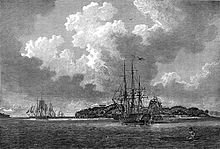1787: First Fleet Sets Sail for Australia
On May 13th, 1787, a momentous event took place that would forever change the course of history. The First Fleet, led by Captain Arthur Phillip, departed from Portsmouth, England, on a daring expedition to establish a penal colony in Australia. This ambitious endeavor marked the beginning of European settlement on the continent and had far-reaching implications for the nation’s future.
The Journey Begins
With eleven ships in tow, the First Fleet embarked on a treacherous voyage across the vast expanse of the ocean. On board were over 1,000 convicts, men and women who had been sentenced to transportation for crimes committed in England. Alongside the convicts were marines, officers, and their families, as well as a variety of supplies and provisions necessary for the establishment of a new colony.
The fleet’s destination was Botany Bay, a location chosen for its potential as an agricultural settlement. The British government hoped that the fertile land and favorable climate would enable the colony to sustain itself and provide valuable resources for the growing British Empire.
The Challenges of the Journey
The journey itself was fraught with difficulties. The ships faced treacherous weather conditions, including storms and rough seas. Disease and malnutrition were rampant on board, leading to the deaths of many convicts and crew members. Despite these hardships, the fleet persevered, driven by the determination to reach their destination and fulfill their mission.
After a grueling eight-month journey, the First Fleet finally arrived at Botany Bay in January 1788. However, upon arrival, they discovered that the area was not as suitable for settlement as initially believed. Captain Phillip made the decision to relocate the colony to a nearby area known as Port Jackson, where they established the settlement of Sydney Cove.
The Legacy of the First Fleet
The establishment of Sydney Cove marked the birth of European settlement in Australia. Over the years, more ships arrived, bringing additional convicts and settlers to the burgeoning colony. The impact of this initial wave of immigration cannot be overstated.
The arrival of the First Fleet had profound implications for the indigenous population of Australia. The arrival of European settlers led to the displacement and marginalization of Aboriginal people, resulting in a significant loss of land, culture, and traditional ways of life.
The legacy of the First Fleet can still be felt in Australia today. The descendants of those early convicts and settlers have played a crucial role in shaping the nation’s history and demographics. Their contributions, along with those of subsequent waves of immigrants, have created a diverse and multicultural society.
Conclusion
The departure of the First Fleet from England on May 13th, 1787, marked a pivotal moment in history. This audacious expedition to establish a penal colony in Australia laid the foundation for European settlement on the continent. Despite the challenges and hardships faced along the way, the fleet successfully reached their destination and set the stage for the development of a new nation.
The story of the First Fleet serves as a reminder of the complexities of history and the impact of colonization. It is a chapter in Australia’s past that cannot be forgotten, and one that continues to shape the nation’s present and future.
For more information on the First Fleet and its journey to Australia, you can refer to the following external references:
- National Museum of Australia – First Fleet Sets Sail for Australia
- Australia.gov.au – First Fleet
- Britannica – First Fleet

